UNAOC Projects
Intercultural Innovation Award
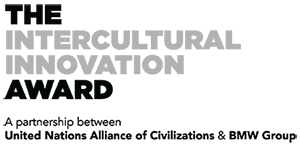
The Intercultural Innovation Award is a partnership between the United Nations Alliance of Civilizations (UNAOC) and the BMW Group that selects and supports the most innovative grassroots projects that encourage intercultural dialogue and work toward a more peaceful and socially inclusive world by building mutual respect among peoples of different cultural and religious identities, rejecting violent extremism and embracing diversity.
The award is given to 10 not-for-profit organizations promoting intercultural dialogue and fostering diverse and inclusive societies. Organizations should be active in the fields of migration and integration; intercultural awareness; education for intercultural citizenship; or be organizations addressing the needs of specific groups in promoting intercultural understanding (e.g. faith-based, youth, women, media, etc.) They must have a track record of managing intercultural projects and willingness to expand their range of action.
By the end of 2020, the award impacted 116 countries. Additionally, the award has benefited more than 6 million individuals around the world since its establishment in 2011.
Intercultural Leaders
 Intercultural Leaders (www.interculturalleaders.org), developed in partnership with the BMW Group, is an exclusive skills & knowledge-sharing platform for civil society organizations and young leaders working to address cross-cultural tensions.
Intercultural Leaders (www.interculturalleaders.org), developed in partnership with the BMW Group, is an exclusive skills & knowledge-sharing platform for civil society organizations and young leaders working to address cross-cultural tensions.
It is the “alumni network” for participants in UNAOC programs and projects.
Participants from various UNAOC programs and projects (Intercultural Innovation Award, Youth Solidarity Fund, Summer School, Entrepreneurs for Social Change, Fellowship Programme), professionals from partner organizations and a group of mentors form Intercultural Leaders.
Through an innovative online system, Intercultural Leaders harnesses the solidarity of its members to maximize the impact of their work and help them foster cross-cultural understanding and cooperation.
By strengthening civil society capacities, Intercultural Leaders also enhances UNAOC’S role as a convener, catalyst, and thought leader.
PLURAL+
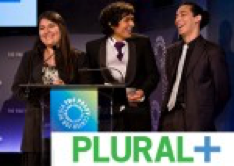 PLURAL+ is a youth video festival and competition for people 25-years old and younger organized in partnership with the International Organization for Migration and the support of more than thirty partners from around the world.
PLURAL+ is a youth video festival and competition for people 25-years old and younger organized in partnership with the International Organization for Migration and the support of more than thirty partners from around the world.
PLURAL+ competitors submit videos focusing on the themes of migration, diversity and social inclusion are submitted to a jury for consideration. The submissions can be a maximum of five minutes in length. More than a festival, PLURAL+ is platform for young people’s voices and opinions on these topics as they address key challenges related to migrant integration, inclusiveness, identity, diversity, human rights and social cohesiveness, both at local and global levels.
With the support of PLURAL+ partners, the winning videos are distributed across the world on multiple platforms, from TV broadcasts to screenings at festivals and the internet.
PLURAL+ recognizes youth as powerful agents of social change in a world often characterized by intolerance, and cultural and religious divisions.
The winning videos are announced in December at an awards ceremony at the Paley Center for Media in New York. [Learn More]
Young Peacebuilders
Guided by the principle that youth are key actors to achieve peace, UNAOC develops educational programming to enhance the ability of young people and their organizations to foster mutual respect, understanding and long-term positive relationships between peoples of different cultures and religions.
The Young Peacebuilders consists of a series of regional workshops that UNAOC intends to implement in different regions of the world to offer competence development to young people and to grow and strengthen the global movement of young peacebuilders. Through this action, UNAOC is committing to support young people’s participation in peacebuilding with a growing coalition of partners.
The programme is designed to support young people in gaining skills that can enhance their positive role in issues of peace and security and in preventing violent conflict. It also brings visibility to the initiatives, actions and projects initiated by young people towards peace and the promotion of diversity and human rights. As such, it responds to recent international policy recommendations outlined in the United Nations Security Council Resolution 2250 on Youth, Peace and Security and the Secretary-General’s Plan of Action on Preventing Violent Extremism. [Learn More]
Youth Solidarity Fund (YSF)
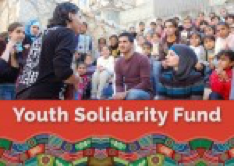 The Youth Solidarity Fund (YSF) provides seed funding to outstanding youth-led initiatives that promote long-term constructive relationships among people from diverse cultural and religious backgrounds to promote more peaceful societies. The fund, established in 2008, links small scale and local work to larger movements for social and global change.
The Youth Solidarity Fund (YSF) provides seed funding to outstanding youth-led initiatives that promote long-term constructive relationships among people from diverse cultural and religious backgrounds to promote more peaceful societies. The fund, established in 2008, links small scale and local work to larger movements for social and global change.
In addition to awarding grants of up to USD 25,000 per project, UNAOC provides youth organizations selected under the Youth Solidarity Fund with in-depth training, technical assistance, peer assistance, and networking opportunities.
Each project has an impact on the local population as a whole, often involving religious or political leaders, policy-makers and media-makers. These projects use innovative methodologies to disseminate peace-related messages (e.g. using arts, cell phones, videos, radio, sports, etc.). Their unique approaches feed into national or local discussions regarding the role of youth in fostering cross-cultural understanding. YSF is funded by several members of the United nations Alliance of Civilizations Group of Friends. [Learn More]
Media and Information Literacy
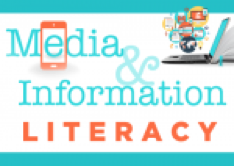 Media and Information Literacy (MIL) initiatives are aimed at helping global citizens understand how media messages impact and influence the shaping of opinions as well as the understanding individuals have of themselves, their communities and the world at large.
Media and Information Literacy (MIL) initiatives are aimed at helping global citizens understand how media messages impact and influence the shaping of opinions as well as the understanding individuals have of themselves, their communities and the world at large.
UNAOC’s MIL efforts include a multi-language web-based MIL clearinghouse (the first of this kind and scope), the creation — with UNESCO — of a global network of universities working on MIL, coordinating MIL workshops for educators, and creating publications.
Gaining Media and Information Literacy is a lifelong learning (formal and informal) educational experience.
By working with education experts, policy makers and mass media producers MIL provides a knowledge base necessary for individuals to be informed consumers of news. By doing so, UNAOC helps people avoid polarization and facilitates better understanding among individuals from different cultural backgrounds.
UNAOC is moving the MIL agenda forward globally by supporting already existing initiatives and providing easy access to resources and information to a growing international community of learners. [Learn More]
Tracking Hatred: An International Dialogue on Hate Speech in the Media
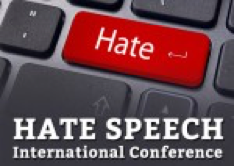 UNAOC’s Hate Speech initiative is a platform for constructive dialogue on Hate Speech and the sharing of best practices. Particular emphasis is placed on engaging the global media space and journalists, particularly those who are well positioned to report, comment on, and investigate xenophobia, Hate Speech, violent extremism and prejudice.
UNAOC’s Hate Speech initiative is a platform for constructive dialogue on Hate Speech and the sharing of best practices. Particular emphasis is placed on engaging the global media space and journalists, particularly those who are well positioned to report, comment on, and investigate xenophobia, Hate Speech, violent extremism and prejudice.
With this initiative, UNAOC examines the different measures that have been taken globally to curb Hate Speech and their limitations, as well as the root causes of Hate Speech, and the impact of structural inequalities. In addition, UNAOC explores the reasons why Hate Speech remains a pervasive element that contributes to violent extremism, and the link between hate speech and the treatment of migrants.
UNAOC’s Hate Speech initiative consists of (1) a series of one-day conferences in different international locations, (2) a strategic media campaign to disseminate and share key messages, and (3) a complete report with concrete recommendations. [Learn More]
Fellowship Programme
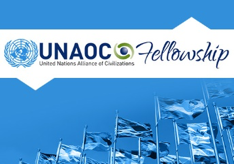 The United Nations Alliance of Civilizations Fellowship Programme aims at fostering intercultural exchange and interfaith understanding by engaging with emerging leaders and young professionals from Europe, North America (EUNA), the Middle East and North Africa (MENA). Framed around two-week exchange trips between EUNA and MENA countries, the Programme sends participants from each geographic group to their counterparts’ region.
The United Nations Alliance of Civilizations Fellowship Programme aims at fostering intercultural exchange and interfaith understanding by engaging with emerging leaders and young professionals from Europe, North America (EUNA), the Middle East and North Africa (MENA). Framed around two-week exchange trips between EUNA and MENA countries, the Programme sends participants from each geographic group to their counterparts’ region.
The Fellowship provides first hand exposure to diversity with the opportunity to experience cultural immersion while interacting with a wide range of local actors and partners. In every country visited, participants are being provided with crucial comprehension tools to understand the plurality and the complexity of their surroundings.
The main objective of the Fellowship is to engage the Fellows in intercultural dialogue to broaden their understanding of culturally-sensitive topics. By exposing participants to new ideas and perspectives, and by immersing them into culturally diverse and unfamiliar environments, the Fellowship Programme aims at challenging perceptions and deconstructing stereotypes. Building on that, participants are then better qualified to develop cross-cultural partnerships and take action on bridging divides between peoples from different faiths and cultures. [Learn More]
Civil Society
Civil Society organizations (CSOs) are at the center of popular movements that impact on each of the pillars that define the work of UNAOC. They provide the grassroots capacity to change attitudes, mold opinions and are essential to the process of making their communities and their countries better places to live. CSOs work at levels closest to the people. Their work multiplies the impact of the programming UNAOC seeks to implement and promote.
CSOs can illuminate issues, advocate positions, challenge authority and promote intergroup dialogue. They operate at the margins of official processes because they cherish their independence. But they also need support. UNAOC engages with CSOs through its different programs, sometimes by providing capacity-building workshops, sometimes by providing seed funding, always with a view to recognize, empower and mentor the most deserving among them.
The High Representative has highlighted his commitment to expanding and growing UNAOC relationships with CSOs since the beginning of his tenure in March 2013.
Media Programming
The media programme is grounded in the philosophy that media have a critical role to play in increasing public understanding of conflicts and issues that polarize communities.
Through a series of projects, the media programme aims to help journalists better cover cross-culturally controversial issues and simultaneously create accurate public perception within the society.
As such, UNAOC convened two seminars on “Covering Migration: Challenges Met and Unmet” in Paris followed by another one in Berne around the same issue. The two seminars brought together editors, journalists and migration experts from Europe and the MENA region to discuss challenges and best practices in the media coverage of migration. (http://www.unaoc.org/2013/01/covering-migration-challenges-met-and-unmet/).
The two seminars culminated in a set of recommendations for how journalists can improve the way they cover migration. (Paris Outcomes Document and Bern Outcomes Document)
Acting on those recommendations UNAOC, with Panos Europe, developed a media-friendly glossary on migration.
UNAOC also developed a series of media trainings with Google and the World Bank: “Digital Tools for Newsgathering & Reporting across Cultures” to learn how to communicate via social media and how to improve their gathering skills.
Migration Programming
The migration programme is based on the notion that in a world of porous borders and rapidly evolving modes of transportation and communications, diverse populations are destined to interact through continued migration presenting new challenges for host countries. How this dynamic is portrayed in the media and discussed by political leaders will determine whether populations view increased diversity as a source of strength or as a threat.
With that in mind, the migration program traverses with UNAOC media and education programs. There are three significant projects:
Organizing media training and seminars for Journalists to discuss challenges, best practices and opportunities in media coverage of migration. Two seminars were convened in Paris and Berne and culminated in a set of recommendations on how journalists can improve the way they cover migration. (Paris Outcomes Document and Bern Outcomes Document)
The objective of developing a media-friendly glossary of terms on covering migration with Panos Institute is to: a) improve the quality and accuracy of migration reporting, b) raise awareness among journalists to the sensitiveness of the topic and c) encourage responsible media coverage of migration providing tools for accuracy, credibility and responsibility.
PLURAL+ (pluralplus.unaoc.org) is a youth video festival and competition for people 25-years old and younger organized in partnership with the International Organization for Migration and the support of more than thirty partners from around the world.
PLURAL+ competitors submit videos focusing on the themes of migration, diversity and social inclusion are submitted to a jury for consideration.
In view of how media greatly influences public views of migrants and migration-related issues, UNAOC together with Panos Europe Institute developed media-friendly glossary that provide journalists with media-friendly definitions of key migration concepts. (View the Media-Friendly Glossary on Migration)